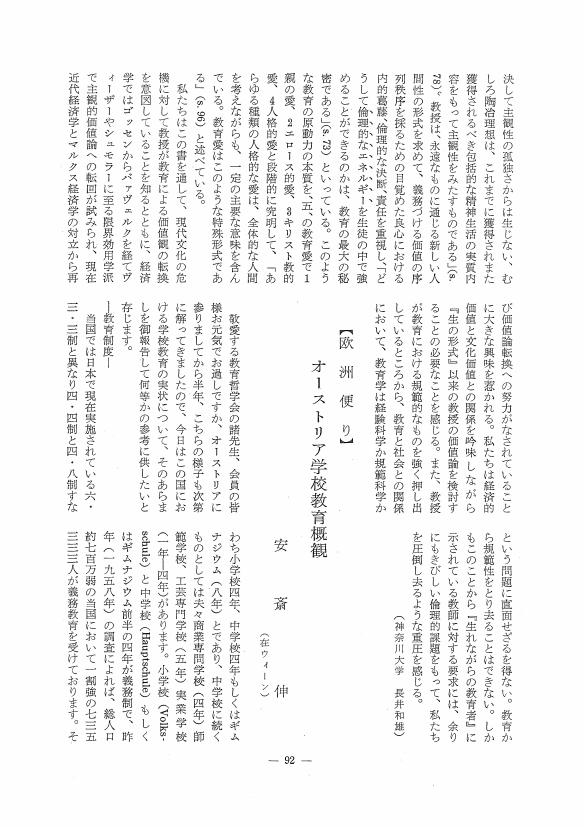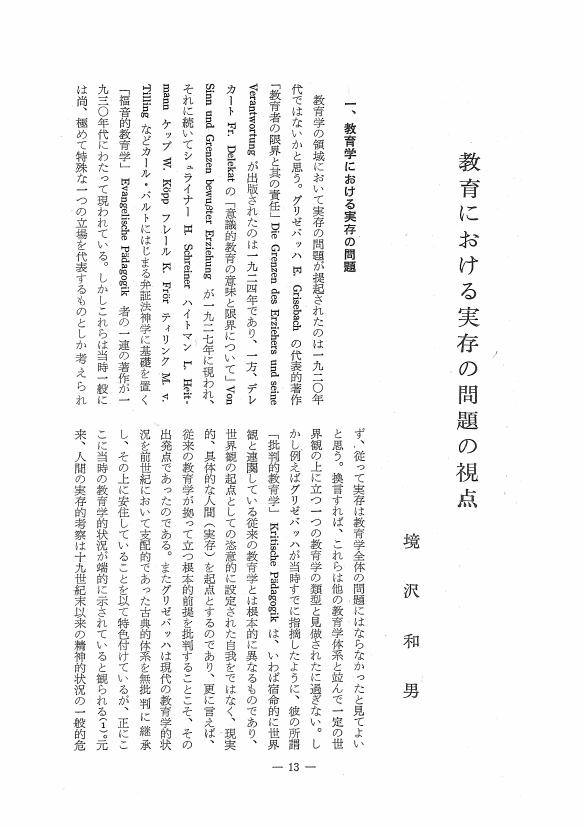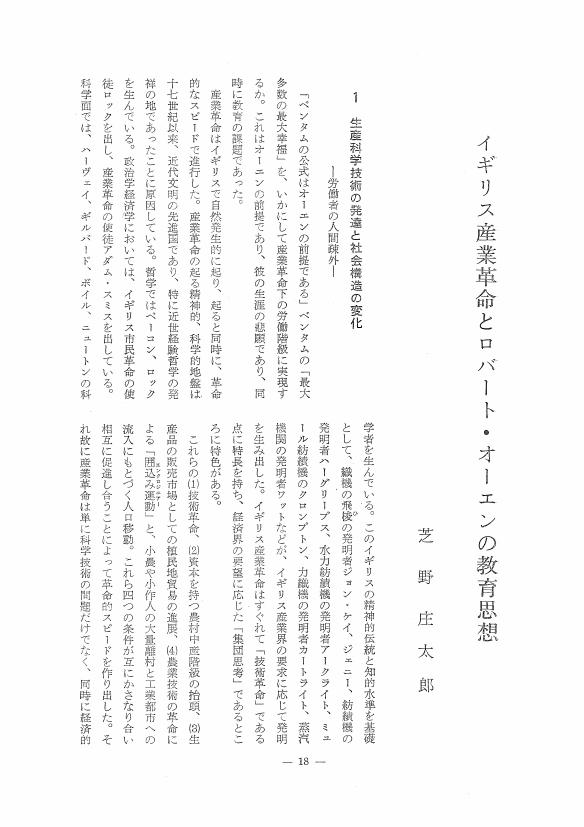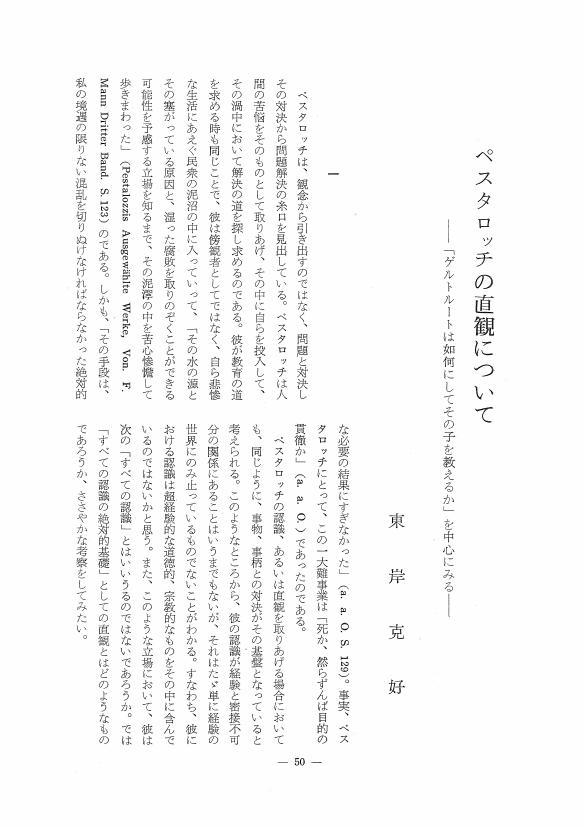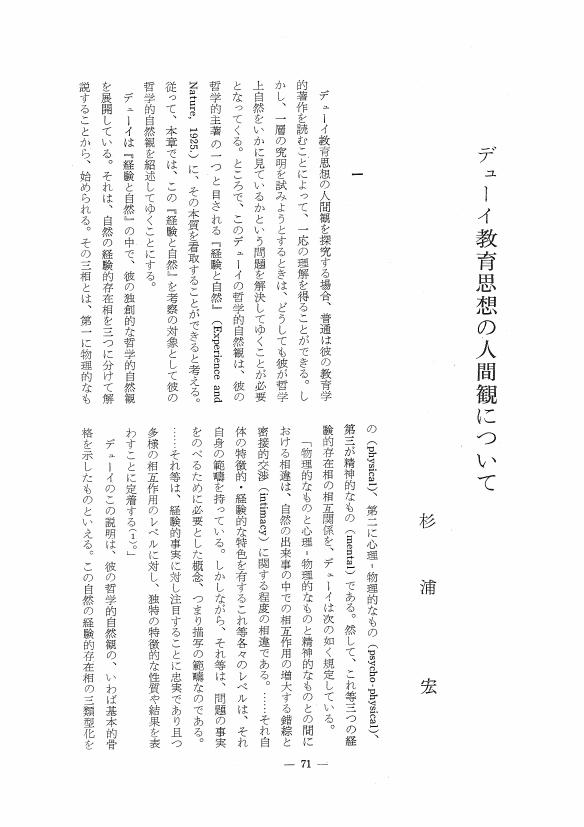1 0 0 0 OA アメリカ教育哲学の現状
- 著者
- 新堀 通也
- 出版者
- 教育哲学会
- 雑誌
- 教育哲学研究 (ISSN:03873153)
- 巻号頁・発行日
- vol.1960, no.2, pp.83-85, 1960-03-01 (Released:2009-09-04)
1 0 0 0 OA アメリカの生活から
- 著者
- 村井 実
- 出版者
- 教育哲学会
- 雑誌
- 教育哲学研究 (ISSN:03873153)
- 巻号頁・発行日
- vol.1960, no.2, pp.85-87, 1960-03-01 (Released:2009-09-04)
十二月二十日に稲富先生がボストンに見え、ちょうど二週間滞在されました。ガツガツと読書に明け暮れていた私の生活にとっては、あたかもクリスマス、新年の休み中ではあり、みじめな教育問題への関心から魂を解放する絶好の機会であったようです。昨日 (四日) 稲富先生をニェーヨークへ送って、明日から再び教育問題にとりつくわけですが、ああ、今日の日がもっともっと長ければ良いのに。
1 0 0 0 OA シラーの homo ludens 的人間論
- 著者
- 増永 良丸
- 出版者
- 教育哲学会
- 雑誌
- 教育哲学研究 (ISSN:03873153)
- 巻号頁・発行日
- vol.1960, no.3, pp.1-18, 1960 (Released:2009-09-04)
- 参考文献数
- 19
We can conceive of man both as homo sapiens and, along lines indicated by such thinkers as Plato and H. Read, as homo ludens. Friederich Schiller's philosophy of man, as developed especially in his Letters on the Aesthetic Education of Man, can certainly be said to be a philosophy of man based on transcendentalism. Schiller, that is to say, conceives of man as composed of three basic impulses the motivational Formtrieb, the Sachtrieb, and the Spieltrieb.It is this third impulse, the Spieltrieb discovered by Schiller at the very center of human nature, which enables man to escape from the exclusive domination of the first two impulses, to enter into a state of reciprocal action and of harmonious union with his fellows, and to. rejoice in freedom as a total unit. It is this Spieltrieb which is man's highest perfection. Its object, according to Schiler, is beauty, and it is precisely homo ludens, man as seeing for beauty, who is the key figure in the transforming action that leads to the ideal moral kingdom. It is at this point that Schiller's philosophy of man is revealed in its educational significance.
1 0 0 0 OA ゲーテの「ファウスト」における世界観と人間像
- 著者
- 志賀 英雄
- 出版者
- 教育哲学会
- 雑誌
- 教育哲学研究 (ISSN:03873153)
- 巻号頁・発行日
- vol.1960, no.3, pp.19-32, 1960 (Released:2009-09-04)
My essay concerns the meaning which Goeth's Faust has for specialists in educational fields. This work of Goethe is certainly one of those books which anyone with a reflective interest in the formation of his own humanity must be familiar with. The reason for this is that Goethe, with his perceptive and prophetic intuition and reflection, presented in symbolic language to the human race that many-faceted idea of the universe and that truth about human nature which only a genius was able to reach. Tne basis of the reputation of Goethe as the “prophet of the new humanity” and of Faust as the “bible of humanity” would seem to lie in the humanistic truth threaded together by the lofty, active idealism revealed in Faust. With this insight to guide me, I have, tried to interpert Faust from the viewpoint of educational philosophy. I cannot help but think that those who have been able to reach some depth in their understanding of Faust are much closer to educational truth than those who are unfamiliar with the work.
1 0 0 0 OA 【欧洲便り】オーストリア学校教育概観
- 著者
- 安斎 伸
- 出版者
- 教育哲学会
- 雑誌
- 教育哲学研究 (ISSN:03873153)
- 巻号頁・発行日
- vol.1959, no.1, pp.92-95, 1959-06-10 (Released:2009-09-04)
1 0 0 0 OA 人間観の変遷と現代教育学
- 著者
- 杉谷 雅文
- 出版者
- 教育哲学会
- 雑誌
- 教育哲学研究 (ISSN:03873153)
- 巻号頁・発行日
- vol.1960, no.2, pp.1-12, 1960-03-01 (Released:2009-09-04)
1 0 0 0 OA 教育における実存の問題の視点
- 著者
- 境沢 和男
- 出版者
- 教育哲学会
- 雑誌
- 教育哲学研究 (ISSN:03873153)
- 巻号頁・発行日
- vol.1960, no.2, pp.13-26, 1960-03-01 (Released:2009-09-04)
- 参考文献数
- 23
1 0 0 0 OA ペスタロッチの das Leben bildetについて
- 著者
- 鈴木 謙三
- 出版者
- 教育哲学会
- 雑誌
- 教育哲学研究 (ISSN:03873153)
- 巻号頁・発行日
- vol.1960, no.2, pp.27-46, 1960-03-01 (Released:2010-01-22)
- 参考文献数
- 49
1 0 0 0 OA 創刊の辞
- 著者
- 稲富 栄次郎
- 出版者
- 教育哲学会
- 雑誌
- 教育哲学研究 (ISSN:03873153)
- 巻号頁・発行日
- vol.1959, no.1, pp.1, 1959-06-10 (Released:2009-09-04)
- 被引用文献数
- 1
1 0 0 0 OA 中江藤樹の教育哲学
- 著者
- 後藤 三郎
- 出版者
- 教育哲学会
- 雑誌
- 教育哲学研究 (ISSN:03873153)
- 巻号頁・発行日
- vol.1959, no.1, pp.2-17, 1959-06-10 (Released:2009-09-04)
1 0 0 0 OA イギリス産業革命とロバート・オーエンの教育思想
- 著者
- 芝野 庄太郎
- 出版者
- 教育哲学会
- 雑誌
- 教育哲学研究 (ISSN:03873153)
- 巻号頁・発行日
- vol.1959, no.1, pp.18-35, 1959-06-10 (Released:2010-01-22)
- 参考文献数
- 41
1 0 0 0 OA ヘーゲルの教育哲学 その構造と背景
- 著者
- 前原 寿
- 出版者
- 教育哲学会
- 雑誌
- 教育哲学研究 (ISSN:03873153)
- 巻号頁・発行日
- vol.1959, no.1, pp.36-49, 1959-06-10 (Released:2009-09-04)
- 参考文献数
- 38
1 0 0 0 OA ペスタロッチの直観について 「ゲルトルートは如何にしてその子を教えるか」を中心にみる
- 著者
- 東岸 克好
- 出版者
- 教育哲学会
- 雑誌
- 教育哲学研究 (ISSN:03873153)
- 巻号頁・発行日
- vol.1959, no.1, pp.50-56, 1959-06-10 (Released:2009-09-04)
1 0 0 0 OA 習慣と構想力 デューイの習慣論について
- 著者
- 高原 博
- 出版者
- 教育哲学会
- 雑誌
- 教育哲学研究 (ISSN:03873153)
- 巻号頁・発行日
- vol.1959, no.1, pp.57-70, 1959-06-10 (Released:2009-09-04)
- 参考文献数
- 9
1 0 0 0 OA デューイ教育思想の人間観について
- 著者
- 杉浦 宏
- 出版者
- 教育哲学会
- 雑誌
- 教育哲学研究 (ISSN:03873153)
- 巻号頁・発行日
- vol.1959, no.1, pp.71-88, 1959-06-10 (Released:2010-01-22)
- 参考文献数
- 68
1 0 0 0 OA テオドル・リット「東西の対立に照らして見た科学と人間形成」
- 著者
- 八幡 康貞
- 出版者
- 教育哲学会
- 雑誌
- 教育哲学研究 (ISSN:03873153)
- 巻号頁・発行日
- vol.1959, no.1, pp.89-91, 1959-06-10 (Released:2009-09-04)
1 0 0 0 OA シュプランガー著「生れながらの教育者」
- 著者
- 長井 和雄
- 出版者
- 教育哲学会
- 雑誌
- 教育哲学研究 (ISSN:03873153)
- 巻号頁・発行日
- vol.1959, no.1, pp.91-92, 1959-06-10 (Released:2009-09-04)
シュプランガー教授の最近著『生れながらの教育者』 (Der geborene Erzieher.1958. Heidelberg. 111 Seiten) は、一九五六年初頭にヴァインガルテンの教育学研究所の修了式において、これから教職に就こうとする若い人々に対して行った講演である。
- 著者
- 椋木 香子
- 出版者
- 教育哲学会
- 雑誌
- 教育哲学研究 = Studies in the philosophy of education (ISSN:03873153)
- 巻号頁・発行日
- no.121, pp.140-146, 2020
1 0 0 0 アリストテレスの公教育論と生きること・学ぶことの意味の回復
- 著者
- 奥平 康照
- 出版者
- 教育哲学会
- 雑誌
- 教育哲学研究 (ISSN:03873153)
- 巻号頁・発行日
- vol.2003, no.87, pp.1-6, 2003
- 著者
- 新井 保幸
- 出版者
- 教育哲学会
- 雑誌
- 教育哲学研究 (ISSN:03873153)
- 巻号頁・発行日
- no.41, pp.p40-56, 1980

